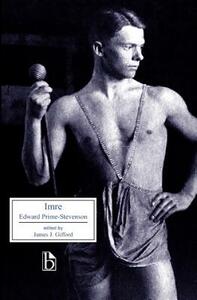Take a photo of a barcode or cover
Well I sort of enjoyed this read but I can't tolerate a writer who thinks the reader isn't smart enough or won't figure out the big reveal at the beginning of the book. I absolutely knew what was going to transpire with IMRE it was so obvious. So I am at a loss of the meaning of this book, truly am.
Would I recommend it, no. But I can add it to my canon of Pre60s homosexual writings. Yes.
Would I recommend it, no. But I can add it to my canon of Pre60s homosexual writings. Yes.
adventurous
emotional
inspiring
lighthearted
relaxing
sad
fast-paced
Plot or Character Driven:
Character
Strong character development:
Yes
Loveable characters:
Yes
Diverse cast of characters:
Yes
Flaws of characters a main focus:
No
challenging
emotional
hopeful
inspiring
reflective
sad
medium-paced
Plot or Character Driven:
Character
Strong character development:
Yes
Loveable characters:
Yes
Diverse cast of characters:
No
Flaws of characters a main focus:
Yes
I loved the story, characters and the ending but the irregular formatting and punctuation was so annoying
emotional
hopeful
inspiring
reflective
sad
medium-paced
Plot or Character Driven:
Character
Strong character development:
Yes
Loveable characters:
Yes
Diverse cast of characters:
Complicated
Flaws of characters a main focus:
Complicated
challenging
inspiring
reflective
relaxing
medium-paced
Plot or Character Driven:
Character
Strong character development:
Yes
Loveable characters:
Yes
Diverse cast of characters:
No
Flaws of characters a main focus:
Yes
It's always interesting to read queer novels not just about the past, but from the past. Like many other similar pieces of the era, it is not just a story, but a manifest. But also a hymn to homosexual love. Although the novel is rather short, the characters are loveable and I couldn't help feeling happy for them in the end.
Moderate: Homophobia
3.5 Deixe- me contar quantas vezes este trecho de Byron é citado neste livro “love that dare not speak its name”.... muitas.
Este é uma ficção com traços autobiográfico sobre o encontro de dois homens ,de amizade para o amor. Um jornalista e um soldado,sem muito plot,mas com bastante diálogos,análises e meandros psicológicos e sociais da epoca , sobretudo de Oswald para o misterioso Imre. Talvez tenha sido um erro ter lido a sinopse antes,pois a estória corre lento,com revelações e afirmações veladas sobre a relação entre Imre e Oswald,afinal porque dois estranhos, caminhando por ruas e frequentando lugares de Budapeste, em apenas semanas,sentem uma amizade tao forte um pelo outro?
Temos uma resposta embora o libro tenha sido um pouco frustrante,por momentos vazio em estética literária, teatral,didático e exagerado (sobretudo nos diálogos final) na reprocidade do amor encontrado e idealizado.
É um livro interessante ,como pesquisa literária e histórica sobre a literatura lgbt do período que o escritor viveu, de repressão e condenação pública do amor gay,o que compensa as falhas na obra.
Este é uma ficção com traços autobiográfico sobre o encontro de dois homens ,de amizade para o amor. Um jornalista e um soldado,sem muito plot,mas com bastante diálogos,análises e meandros psicológicos e sociais da epoca , sobretudo de Oswald para o misterioso Imre. Talvez tenha sido um erro ter lido a sinopse antes,pois a estória corre lento,com revelações e afirmações veladas sobre a relação entre Imre e Oswald,afinal porque dois estranhos, caminhando por ruas e frequentando lugares de Budapeste, em apenas semanas,sentem uma amizade tao forte um pelo outro?
Temos uma resposta embora o libro tenha sido um pouco frustrante,por momentos vazio em estética literária, teatral,didático e exagerado (sobretudo nos diálogos final) na reprocidade do amor encontrado e idealizado.
É um livro interessante ,como pesquisa literária e histórica sobre a literatura lgbt do período que o escritor viveu, de repressão e condenação pública do amor gay,o que compensa as falhas na obra.
This is a very short book, a big portion of which consists of long monologues about homosexuality. It's interesting to see the thoughts brought forward and how it responds to the contemporary views of homosexuality, but since I'm not fully familiar with the historical context of this exact piece of discourse it feels difficult to analyse it fairly.
Although the actual plot is pretty thin I adored what there was of it. The quick bond that formed between the two men really drew me in, and I felt their pain and fear as they tried cautiously to figure out each other's views on homosexuality, neither daring to ask outright or say what was really in their hearts. There are some soul-baring monologues, heart-felt letters, and most importantly a happy ending with an embrace and a proclamation of love.
In general this is a mix of a dry treatise and a sweet, if simple, love story, but the simple fact that it's a novel written in 1906 that both treats the gay characters as sympathetic and also gives them a happy ending, united and in love, makes me very happy.
Although the actual plot is pretty thin I adored what there was of it. The quick bond that formed between the two men really drew me in, and I felt their pain and fear as they tried cautiously to figure out each other's views on homosexuality, neither daring to ask outright or say what was really in their hearts. There are some soul-baring monologues, heart-felt letters, and most importantly a happy ending with an embrace and a proclamation of love.
In general this is a mix of a dry treatise and a sweet, if simple, love story, but the simple fact that it's a novel written in 1906 that both treats the gay characters as sympathetic and also gives them a happy ending, united and in love, makes me very happy.
emotional
hopeful
inspiring
reflective
fast-paced
Plot or Character Driven:
Character
Strong character development:
Yes
Loveable characters:
Yes
Diverse cast of characters:
Complicated
Flaws of characters a main focus:
Complicated
emotional
reflective
sad
medium-paced
This very slim book's (the novella proper is under 100 pages - the rest of this volume is supplementary material) notoriety comes from being perhaps the first American gay story (from 1906) with a 'happy' ending. But unlike its near contemporary, Forster's Maurice, it lacks more than rudimentary literary/narrative value. Prime-Stevenson also composed a 600 page apologia on what he calls 'simulasexuality', and much of the novel is didactic cribbing from that, which makes for very sluggish reading.






